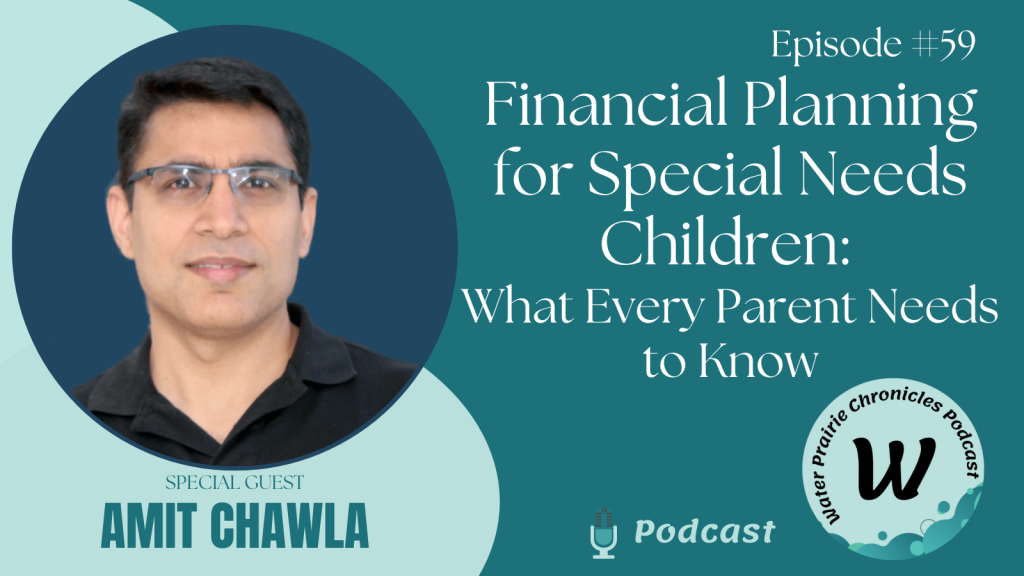Episode #59: Financial Planning for Special Needs Children
How Families Can Ensure Their Child with Disabilities Has a Secure Financial Future Show Notes: In this episode of the Water Prairie Chronicles, your host, Tonya Wollum, speaks with financial planner Amit Chawla about the importance of financial planning for families with special needs individuals. Drawing on his personal experience of having a son with a disability, Chawla highlights the need for proactive planning to ensure that parents are adequately prepared for their child's future financial needs. He provides valuable information on government benefits such as Supplemental Security Income (SSI) and Medicaid, as well as misconceptions about financial planning for individuals with disabilities. Chawla emphasizes the importance of seeking guidance and resources from government agencies and nonprofit organizations, and planning for the worst-case scenario. He also suggests finding other ways to fund their child's needs, such as utilizing resources like nonprofit organizations or community support. Overall, Chawla's interview underscores the crucial role financial planning plays in ensuring that families with special needs individuals can provide the best care and support possible. Connect with Amit: Podcast: https://planningforspecialneeds.podbean.com Facebook: https://www.facebook.com/MySpecialFP Instagram: https://www.instagram.com/MySpecialFP/ LinkedIn: https://www.linkedin.com/company/my-special-financial-planning/ YouTube Channel: https://www.youtube.com/@PlanningForSpecialNeeds ** My Special Financial Planning is a Financial Planning service for the Special Needs community. Pro Bono if you are not earning over $100K/year individually or $125K/year as a family, and have savings of less than $250K. Waiver programs: https://www.kidswaivers.org/, It provides details of all waiver programs (by state) for children with disabilities or medical needs. Some of these waivers consider family income and some don't. Connect with Us: https://linktr.ee/waterprairie Support this channel: https://www.buymeacoffee.com/waterprairie MOTHERS DAY BOOK BUNDLE GIVEAWAY! Grab your chance to win 2 signed books about Sofia Sanchez, a teen actress, model, and advocate for Down syndrome! Go to https://waterprairie.com/giveaway for details! Get a BONUS entry by answering some questions about this podcast episode: https://forms.gle/9dEy4TxjGvjMybXk6 Music Used: “LazyDay” by Audionautix is licensed under a Creative Commons Attribution 4.0 license. https://creativecommons.org/licenses/by/4.0/ Artist: http://audionautix.com/ Meet Today's Guest: Amit Chawla is a Software Product Manager and founder of My Special Financial Planning, a financial planning company that focuses on special needs families. He and his wife, an Estate Planning Attorney, have two boys and reside in Lexington, Massachusetts. Their oldest son is 13 years old and has Autism, which led Amit to become a certified financial planner and chartered special needs consultant. Amit's goal is to help families with special needs members plan for a better future. He volunteers for a couple of non-profit organizations to provide pro bono financial planning services, and he and his wife moderate a private Facebook group called Planning for Special Needs. Amit shares openly about his experience with raising a son on the severe side of the Autism spectrum and how it led him to become a passionate advocate for special needs financial planning.
What Every Parent Needs to Know
The Water Prairie Chronicles Podcast airs new episodes every Friday at Noon EST!
Find the full directory at waterprairie.com/listen.
How Families Can Ensure Their Child with Disabilities Has a Secure Financial Future
Show Notes:
In this episode of the Water Prairie Chronicles, your host, Tonya Wollum, speaks with financial planner Amit Chawla about the importance of financial planning for special needs children. Drawing on his personal experience of having a son with a disability, Chawla highlights the need for proactive planning to ensure that parents are adequately prepared for their child’s future financial needs. He provides valuable information on government benefits such as Supplemental Security Income (SSI) and Medicaid, as well as misconceptions about financial planning for individuals with disabilities. Chawla emphasizes the importance of seeking guidance and resources from government agencies and nonprofit organizations, and planning for the worst-case scenario. He also suggests finding other ways to fund their child’s needs, such as utilizing resources like nonprofit organizations or community support. Overall, Chawla’s interview underscores the crucial role financial planning plays in ensuring that families with special needs individuals can provide the best care and support possible.
Connect with Amit:
- Podcast: https://planningforspecialneeds.podbean.com
- Facebook: https://www.facebook.com/MySpecialFP
- Instagram: https://www.instagram.com/MySpecialFP/
- LinkedIn: https://www.linkedin.com/company/my-special-financial-planning/
- YouTube Channel: https://www.youtube.com/@PlanningForSpecialNeeds
** My Special Financial Planning is a Financial Planning service for the Special Needs community. Pro Bono if you are not earning over $100K/year individually or $125K/year as a family, and have savings of less than $250K.
Waiver programs: https://www.kidswaivers.org/, It provides details of all waiver programs (by state) for children with disabilities or medical needs. Some of these waivers consider family income and some don’t.
Connect with Us: https://linktr.ee/waterprairie
Support this channel: https://www.buymeacoffee.com/waterprairie
MOTHERS DAY BOOK BUNDLE GIVEAWAY!
Grab your chance to win 2 signed books about Sofia Sanchez, a teen actress, model, and advocate for Down syndrome!
Go to https://waterprairie.com/giveaway for details!
Get a BONUS entry by answering some questions about this podcast episode: https://forms.gle/9dEy4TxjGvjMybXk6

Music Used: “LazyDay” by Audionautix is licensed under a Creative Commons Attribution 4.0 license. https://creativecommons.org/licenses/by/4.0/ Artist: http://audionautix.com/
Meet Today’s Guest:
 Amit Chawla is a Software Product Manager and founder of My Special Financial Planning, a financial planning company that focuses on special needs families. He and his wife, an Estate Planning Attorney, have two boys and reside in Lexington, Massachusetts. Their oldest son is 13 years old and has Autism, which led Amit to become a certified financial planner and chartered special needs consultant. Amit’s goal is to help families with special needs members plan for a better future. He volunteers for a couple of non-profit organizations to provide pro bono financial planning services, and he and his wife moderate a private Facebook group called Planning for Special Needs. Amit shares openly about his experience with raising a son on the severe side of the Autism spectrum and how it led him to become a passionate advocate for special needs financial planning.
Amit Chawla is a Software Product Manager and founder of My Special Financial Planning, a financial planning company that focuses on special needs families. He and his wife, an Estate Planning Attorney, have two boys and reside in Lexington, Massachusetts. Their oldest son is 13 years old and has Autism, which led Amit to become a certified financial planner and chartered special needs consultant. Amit’s goal is to help families with special needs members plan for a better future. He volunteers for a couple of non-profit organizations to provide pro bono financial planning services, and he and his wife moderate a private Facebook group called Planning for Special Needs. Amit shares openly about his experience with raising a son on the severe side of the Autism spectrum and how it led him to become a passionate advocate for special needs financial planning.
Episode #59: Financial Planning for Special Needs Children
What Every Parent Needs to Know
(Recorded March 11, 2023)

In episode 59 of the Water Prairie Chronicles, financial planner Amit Chawla speaks with Tonya Wollum about the importance of financial planning for individuals with disabilities. Chawla shares his personal experience of having a son with a disability and realizing that financial planning is crucial for supporting his family in the long term.
Chawla notes that individuals with disabilities are entitled to free and fair education until age 22, and that there are various government benefits that can help cover costs. However, parents must be proactive in seeking guidance and resources from government agencies and nonprofit organizations. This is especially important for families who may face financial challenges in providing the support their child needs.
One of the government benefits discussed in the interview is Supplemental Security Income (SSI), which provides financial assistance to people with disabilities who have limited income and resources. Chawla explains that a child must be diagnosed with a disability to be eligible for SSI, and their income must be below a certain limit. Before a child turns 18, their parents’ income is deemed towards them, which can affect their eligibility for SSI. The interview also covers Medicaid, which is another government benefit that provides medical insurance to people with disabilities or low income. Chawla notes that many states have Medicaid waiver programs, which do not count parents’ income for their child to be eligible for Medicaid.
Chawla also addresses common misconceptions about financial planning for individuals with disabilities, such as the belief that having a lot of resources is sufficient for long-term financial security. He explains that even wealthy individuals cannot rely solely on their own resources and that there are many programs and resources available to support individuals with disabilities. He emphasizes the importance of seeking help and guidance and having an open heart and willingness to learn.
The interview also touches on educational purposes, and Amit notes that any funds put aside for a child’s education must be used for educational purposes. In addition, he suggests spending the money on the child’s needs to avoid any legal complications.
The conversation ends with a discussion on the challenges parents may face when securing financial support for their child. Chawla suggests working with a professional to determine how much money the child may need in the future, and planning for the worst-case scenario, assuming that the child may not receive any government benefits. For those who are not able to earn enough, Chawla suggests finding other ways to fund their child’s needs, such as utilizing resources like nonprofit organizations or community support.
Overall, the interview with Amit Chawla highlights the importance of financial planning for families with special needs individuals. Chawla provides valuable information on government benefits such as SSI and Medicaid, and suggests proactive planning to ensure that parents are adequately prepared for their child’s future financial needs.
Families who have a special needs child must plan for the future early on. The journey of caring for someone with special needs is often lifelong, and financial planning plays a crucial role in ensuring that the child receives the best care and support possible. Even families with limited resources can benefit from seeking help and guidance from government agencies, nonprofit organizations, and qualified financial planners who specialize in special needs planning.
Amit Chawla’s personal experience with his son with a disability makes him an ideal resource for families who are starting their financial planning journey. His emphasis on proactive planning, seeking guidance, and finding other ways to fund their child’s needs underscores the importance of financial planning for individuals with disabilities.
